| |
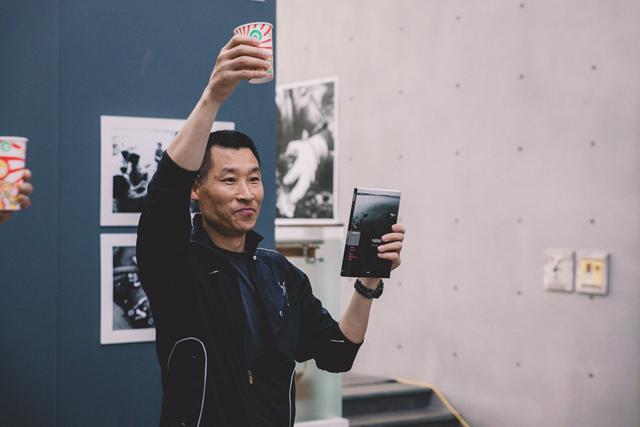 |
|
| ▲ Kwon Choul, known as 'the Sniper,' at a special talk at Jeju National University on May 23. Photo by Maya Sinji Jung |
After a widely praised journey marked by devastation and resilience, photojournalist Kwon Choul returned from a 20-year stint in Japan to his homeland, Korea.
His first project upon returning is ‘Iho Tewoo,’ exhibited at Jeju University Museum Gallery from May 22 to 28.
Rather than portray museum-like, anachronistic images of the diving women, his work exposes the reality of haenyeo life in the face of relentless development.
Throughout his career Kwon has covered a variety of hard-hitting subjects from the Tokyo underworld and the characters of a leprosy colony, to the rubble of the Sichuan Earthquake and the Fukushima meltdown.
| |
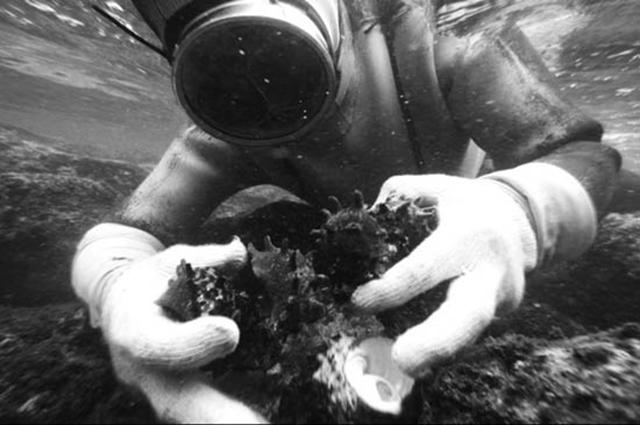 |
|
| ▲ Kwon Choul is known for his candid realism. Photo by Kwon Choul |
All of his work questions official narratives and illuminates the hidden, proclaiming that even the painful truth can be beautiful in its complexity and contradictions.
Event curator and interview journalist Sinji Jung said Kwon retains seriousness in his shots, yet it retains its sentimentality: “I’ve seen that in no other man,” she said.
Previously a civil engineer, Kwon took up photography in 1994 as he was disillusioned with the industry and Korea’s rapid development after the collapse of both Seongsu Bridge and Sampoong Department Store.
| |
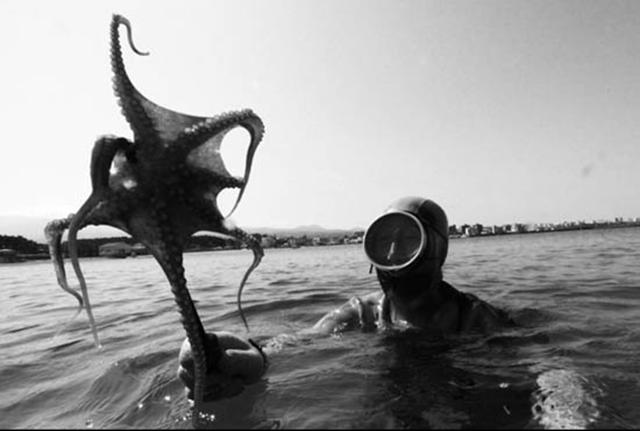 |
|
| ▲ Kwon got close to the haenyeo by 'buddying up with the oldest.' Photo by Kwon Choul |
After moving to Japan and studying under photography master Higuchi Kenji, he gained recognition as a “sniper photographer” for documenting Japanese nightlife and yakuza gangster culture.
Later his images of Tetjang struck a chord as the Korean poet’s spirit shone through despite disfigurement from Hansen’s disease (commonly known as leprosy).
Kwon’s career took a turn in 2008 after covering China’s Sichuan Province earthquake which claimed over 80,000 lives.
| |
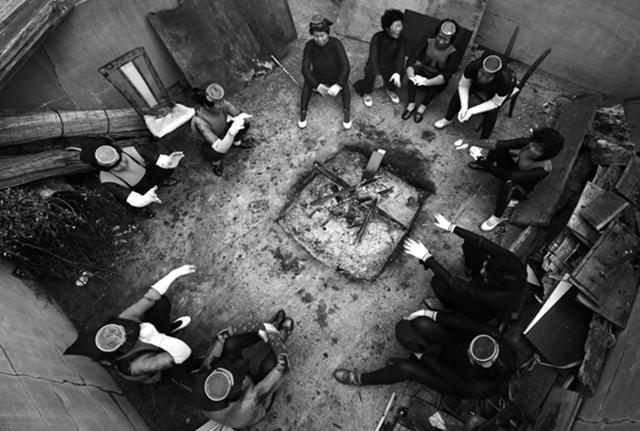 |
|
| ▲ His work has a grittiness not present in idealised images of the diving women. Photo by Kwon Choul |
He witnessed colleagues adjust photos to make the blood look more vibrant, and saw critically injured children transferred from hospital to hide them from the visiting prime minister.
He met a 12-year-old girl who, having been trapped under rubble, had had her legs amputated with a saw by a rescue worker, without the use of anesthetic.
Kwon was immensely affected, and in the aftermath he withdrew as a mainstream photojournalist, refusing to participate in the exploitative, albeit profitable, sensationalism of suffering.
| |
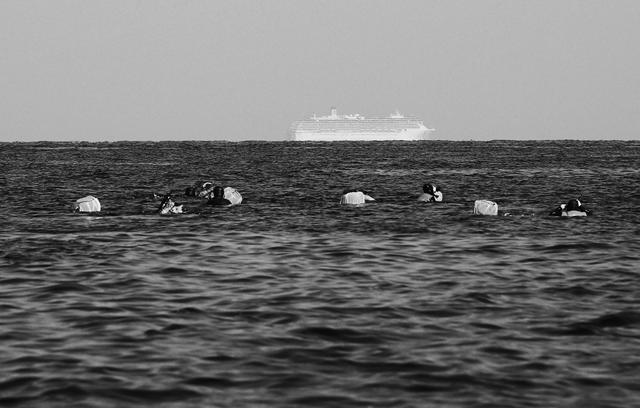 |
|
| ▲ His series on the haenyeo at Iho portrays them as the rapid development lurks over their shoulders. Photo by Kwon Choul |
He shifted his priorities and returned to Korea, only for the Sewol ferry disaster to happen soon after. For Kwon, it proved that not much had changed in the 20 years since his leaving and the disasters of 1994.
These instances evinced the certainty of human error despite the veneer of progress, the very thing that propelled Kwon to leave in the first place.
It is this veneer of progress that is the crux of his work on Iho’s haenyeo, exploring the contrast between this enduring tradition and the rapid growth closing in on it.
| |
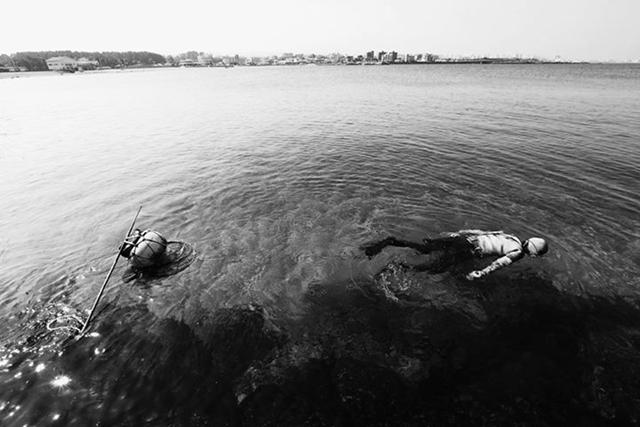 |
|
| ▲ Photo by Kwon Choul |
Kwon Choul passed three months with the grannies of Iho Village, buddying up with the oldest haenyeo in town as he helped her carry her equipment.
Curator Jung says the situation in the village is “terrifying” as the women confront the megalith that is development.
The village has a new aquaculture fish farm, where 22 haenyeo currently work, and there is the looming Iho Land Resort, sold to the Chinese Bunma Group and set to feature a foreigner-only casino, which is likely to dominate much of the coastline and potentially privatize part of the beach.
| |
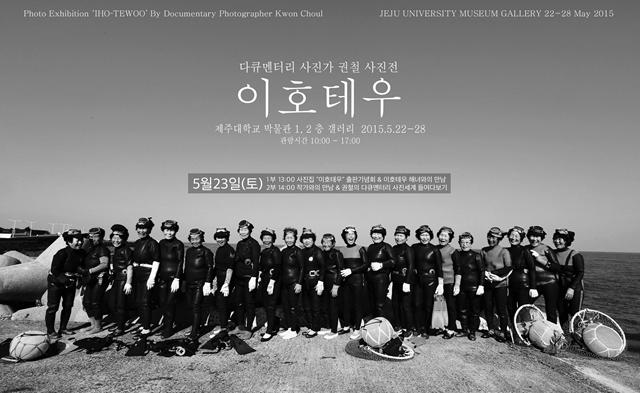 |
|
| ▲ Photo by Kwon Choul |
Despite this, the haenyeo have mixed feelings about the changes. Many have accepted the end of an era and were actually happy to sell their land at inflated prices.
“What can you do when offered, let’s say, 100 times more money than you ever would otherwise?” asks Jung.
It is this complexity that Kwon displays in his images, as the haenyeo enjoy their lives despite an uncertain future. Indeed, Kwon’s photography affirms that they’ve not quite gone into the sterile history of a museum. They’re still here.
Opening event for Kwon Choul's Iho Tewoo
Curated and organized by Sinji Jung, the opening event for Kwon Choul's Iho Tewoo at Jeju University Museum was a success on Saturday, May 23. Spirits were bright as the haenyeo women diver subjects were present to see shots of themselves in action.
The black-and-white photos not only portrayed the dynamic women in the sea, but also communal scenes of them lounging together, reflecting on their work and enjoying each other’s company with some makgeolli, or rice wine
After photographer Kwon expressed his gratitude with a toast and gifts, curator Sinji Jung and musicians Tanner Jones, Donghee Lee, and Minkyeong Ha performed traditional songs for the haenyeo and attendees.
To finish the afternoon, Kwon gave a presentation of his life’s work.
|


























